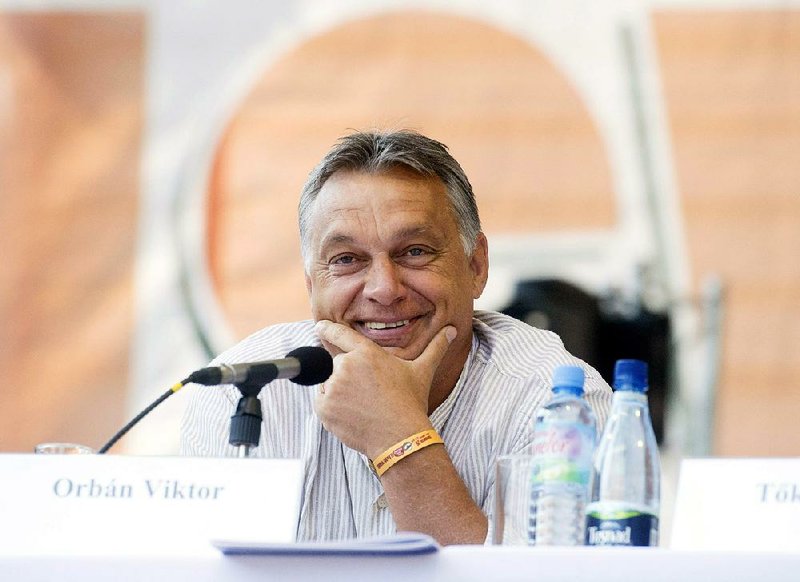BUDAPEST, Hungary -- Illegal immigration is a threat to Hungary and all of Europe, with the biggest risk coming from hundreds of millions of people from the "depths of Africa" looking to escape poverty, Hungarian Prime Minister Viktor Orban said Saturday.
Over 90,000 refugees and others have reached Hungary so far this year, and it is building a 13-foot-high fence on its border with Serbia to stem the flow. While the government had set a Nov. 30 deadline, Orban said the fence would be completed by Aug. 31.
Speaking at a cultural festival in Baile Tusnad, Romania, Orban accused the European Union of failing to defend its citizens from the "masses of illegal immigrants" who he said threaten the cultural identity of European countries and contribute to increased terrorism, unemployment and criminality.
"For us, today Europe is at stake," Orban said. "The survival, disappearance or, more precisely, the transformation beyond recognition of the European citizen's lifestyle, European values and the European nations.
"The question now is not only what kind of Europe we Hungarians would like to live in," Orban said. "Rather, will all that we now call Europe exist at all?
"It is clear that we can't filter out the hostile terrorists in the huge crowds," Orban said, adding that there had been a "drastic increase" in crime where illegal migrants lived.
"We would like for Europe to keep belonging to the Europeans," Orban said. "We want to preserve the Hungarian Hungary."
Most refugees who request asylum in Hungary quickly leave for other destinations in the EU like Germany or Sweden before their cases are settled. Orban has repeatedly said that Hungary does not want any migrants from outside Europe and has been granting asylum to just a few hundred annually in the past several years.
Hungary has registered more than 80,000 illegal migrants so far this year, nearly double the number for all of last year, according to official data.
"The really serious threats are arriving not from the war zones ... but from the depths of Africa," Orban said. "Northern Africa today can no longer defend Europe from the immense masses of people."
EU governments this month failed to agree on plans to disperse 40,000 people who have arrived in Italy and Greece from violence-ravaged northern Africa and the Middle East as several EU countries, including Hungary, refused to take part.
Orban said Europe has become "too wedded to ideologies" based on human rights and multiculturalism, hampering the 28-member bloc's ability to resolve problems such as migration and economic challenges such as that in Greece. The answer isn't the "crazy idea" of a federal Europe but rather stronger member states, he said.
Orban spoke to mostly young supporters at the same cultural festival where a year ago he outlined plans to convert Hungary into an "illiberal state" such as Russia, China and Singapore. That idea, as well as his accusations that civic groups critical of his government were working for foreign interests, drew widespread criticism, including from President Barack Obama.
This time, Orban lashed out mainly against the EU leadership in Brussels and leftist ideology, accusing them of willfully supporting immigration to weaken Europe's nations and their unique cultures.
"The European left sees the problem of immigration not as a source of danger but as an opportunity," Orban said. "They believe ... that the escalation of immigration can extremely weaken or even eliminate the national structures."
Orban is in his third term as prime minister. He first led Hungary between 1998 and 2002, returning with a landslide majority in 2010 after Socialist-led governments were unable to solve the country's growing economic problems.
Information for this article was contributed by Zoltan Simon of Bloomberg News.
A Section on 07/26/2015

